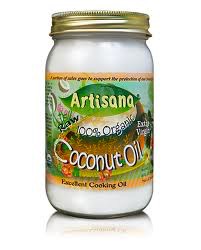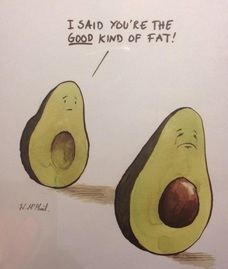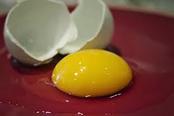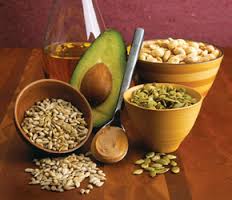|
Last week, I wrote about the sugar industry and how they demonized fats in order to take the spotlight off of the dangers of sugar in the diet. Now you need to hear the "skinny" about fats. Fats are one of the 3 macronutrients, along with proteins and carbohydrates that keep our bodies functioning properly. Weight issues are often blamed on fats. We are told that if we simply eliminated fats from our diet, we would be healthier. However, not all fats are created equal. Fats are an important part of a healthy diet and we need them for optimal health. They provide essential fatty acids, keep our skin soft, deliver fat-soluble vitamins, and are a great source of energizing fuel. Let's take a look at the different types of fats - the good, the bad, and the ugly.
SATURATED FATS These fats are stable at higher temperatures and are less likely to be damaged during cooking. The body needs saturated fat. Our liver uses these to manufacture cholesterol, which is an important component of our cell membranes. These fats actually improve your overall cholesterol profile in the face of a low-carb diet by lowering triglycerides, raising HDL, and decreasing the small, dangerous LDL particles. Saturated fats include animal fats, dairy fats, and oils like coconut (my favorite!) and palm.
UNSATURATED FATS When these fats are eaten in moderation and used to replace trans fats, they can actually help to lower cholesterol, ease inflammation, and reduce your risk of heart disease. There are two types of unsaturated fats: monounsaturated and polyunsaturated:
Polyunsaturated fats increase good cholesterol and contain the essential fatty acids that we want as part of our diet. Essential fatty acids are those fats that are not made in the body and that are essential for us to consume in our diet. These heart-healthy polyunsaturated fats are called omega-3 and omega-6 fatty acids. A diet consisting of a ratio between 2:1 and 4:1 of omega-6 to omega-3 is recommended. Nearly all chemical communication throughout the body depends in part on the correct balance between omega-6 and omega-3 fatty acids.
References:
Haas, E. (2006). Staying healthy with nutrition. Berkeley, CA: Celestial Arts. Hyman, M. (2016). Eat fat, get thin. New York, NY: Little, Brown, & Company. Hyman, M. (2012). The blood sugar solution. New York, NY: Little, Brown, & Company. Knuteson, M. (2013). Coconut oil. Retrieved from: http://herballegacy.com/Coconut%20Oil.pdf Murray, M. (2005). The encyclopedia of healing foods. New York, NY: Atria Books. Wood, R. (2010). The new whole foods encyclopedia. New York, NY: Penguin Books.
3 Comments
Gloria Capron
9/28/2016 05:06:54 am
Thanks for the info!!!
Reply
Cheryl Esper
9/28/2016 07:19:13 am
Thank you for untangling the fat web! I was aware of which were good and bad, but never understood exactly why or how they interacted with the body.
Reply
Kristin
9/28/2016 08:05:54 am
What a great question! The difference between coconut oil and coconut butter is that the oil is simply oil that has been extracted from the meat of the coconut. As I mentioned in the blog, it is a wonderful source of medium chain fatty acids. I love the oil for cooking, like sautéing vegetables and cooking my eggs. The coconut butter is made from the meat or flesh of the coconut. Since it is essentially pureed coconut meat, it has a thick and creamy texture and is about 60% oil. They both have similar nutritional characteristics, but the butter also contains fiber, protein, and minerals. As far as I know there are not different types of coconut butter, but there certainly are different brands. Each brand may have a unique taste. You have to find one that you like best. Be sure that the only ingredient is organic raw coconut. My favorite brand is Artisana Organics. I would not recommend cooking with the butter. It is more of a spread to be put on toast, fruit, or pancakes. It is super yummy and I often put it in a smoothie in the morning or I just put it on a spoon and eat it.
Reply
Leave a Reply. |
All of the information on this website is Copyright © CookingwithKristin.com 2017 and may not be downloaded, reproduced, republished or otherwise copied without express written permission of CookingwithKristin.com.







